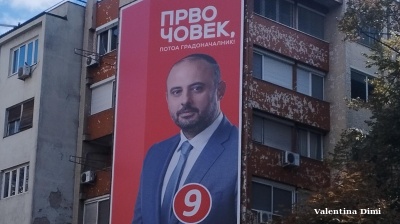Macedonia’s previous government, led by the conservative VMRO-DPMNE party which is now in opposition, spent at least €225mn in a non-transparent way to attract foreign investors, the new government claimed on September 13.
The VMRO-DPMNE-led government made huge efforts to attract foreign investors, offering them benefits such as tax reliefs to build factories in free industrial zones.
The expenditures were disclosed after the current Social Democrat-led government announced at the end of August that it had launched a procedure to declassify all information related to the contracts for providing state subsidies to foreign investors and analyse the data. The sum was spent between 2007 and May 2017, to secure the entry of 25 foreign investors, which employed around 20,000 people, government spokesperson Mile Bosnjakovski said, citing data from the analysis. However, the amount of state subsidies that were allocated by the previous government on the basis of negotiations differed from one company to another.
Statistics office data showed that in the period under review Macedonia attracted over €2.7bn in FDI, most of which was in 2007 and 2008.
"The previous cabinet spent up to €11,000 for each new job in factories opened by foreign investors, or a total of €14mn for creating new jobs in the free industrial zones," Bosnjakovski said.
Some investors received €100 for each job, while others were given €11,000 in state aid.
Macedonia has one of the highest jobless rates in Europe, standing at 22.6% at the end of Q2 2017. The rate was slashed significantly after VMRO-DPMNE came to power in 2006, when it stood at 36%. However, the figure does not reflect the real picture due to the amended methodology, which does not include people in the jobless category who are not officially employed or have part-time jobs.
The government spokesperson also said that around €26mn was transferred to foreign firms as grants in the period under review, while €69mn was spent from the budget on tax and customs relief for foreign investors. The remainder, around €130mn, was paid to promoters or spent on foreign trips to attract foreign investors. Foreign firms were given a further €5mn to train local staff.
“The process was totally non-transparent,” Bosnjakovski noted.
“Negotiations with foreign investors were conducted by ministers, promoters, councillors without any criteria. Also, there was no document or instructions for negotiations,” the spokesperson said.
Following the negotiations, the government led by former Prime Minister Nikola Gruevski kept the contracts away from the public.
Some of the foreign firms received more money and benefits, and others less. However, bigger companies benefited the most. The largest share of the money was given to automotive companies Johnson Controls, Johnson Matthey and Draexlmaier, according to the analysis.
Despite the revelations, Bosnjakovski underlined that the concluded contracts are valid and all foreign companies will receive the promised tax reliefs and benefits.
However, unlike the claims of the previous government, Bosnjakovski said that the analysis showed that local companies did not benefit greatly from the presence of foreign investors, as the investors were supplied mostly by firms from abroad.
The new government is now proposing that it will offer the same benefits for local companies to invest in the country as those offered to foreign ones.
The Social Democratic Union of Macedonia (SDSM) came to power at the end of May in coalition with two ethnic Albanian parties ending a decade of rule by VMRO-DPMNE. They promised a more transparent way of ruling.
The declassification of the contracts was aimed at making the process of providing state subsidies more transparent. This is one of the measures in the new government’s Plan 3-6-9 for urgent priority reforms, which contains short, medium and long-term plans to support the country’s bid for EU accession.
On September 14, the new government will announce a new set of economic measures including those for attracting foreign investors as well as to support local companies.
News

Mongolia’s PM ousted as party infighting topples government
Right to challenge sacking means battle may not be over. Observer says confrontation is linked to desire for control of country’s vast coal resources.

Ex-chairman of Istanbul-listed Sisecam hit with travel ban in Can Holding investigation
Company is controlled by "Ataturk" bank Isbank, which has previously been in the crosshairs of Turkish president Erdogan.

Ghana’s dormant TOR refinery to restart crude operations by October-end
Ghana has long struggled to translate its crude output into refined fuel security. Successive governments have pledged to revive TOR, which has faced years of debt, mismanagement, and technical breakdowns.

No Tomahawks for Ukraine, Trump to meet Putin in Hungary
The US cannot deplete its own stockpile of Tomahawk cruise missiles by supplying them to Ukraine, President Donald Trump said at a press conference on October 16 following a phone conversation with Russian President Vladimir Putin.

 Cropped.jpg)


